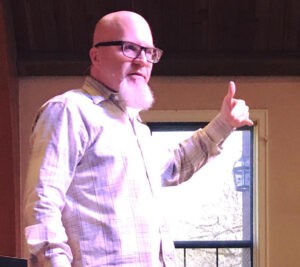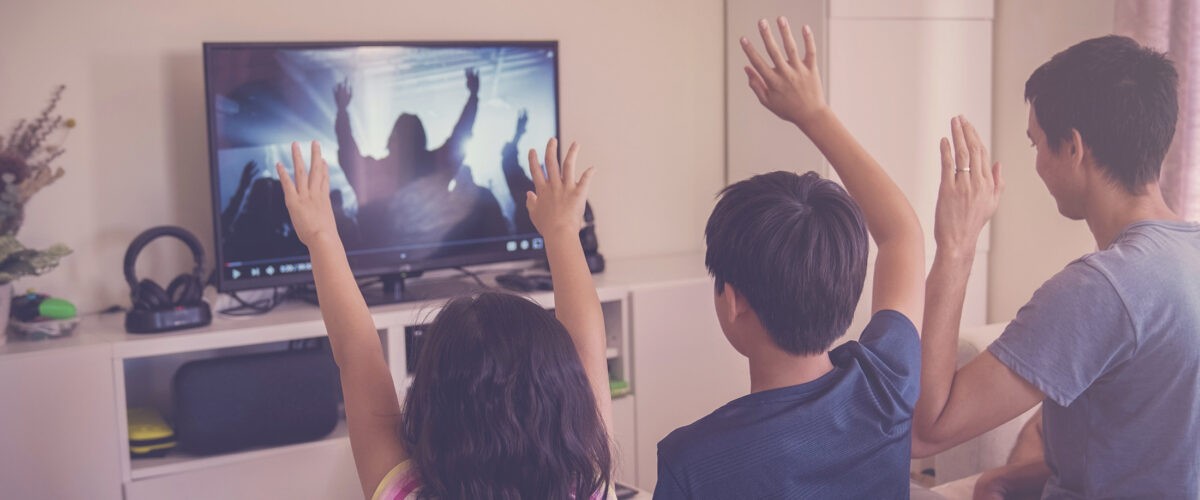“I think it’s time to drop the virtual option,” says Tish Harrison Warren in an op-ed for the New York Times, arguing that churches should stop livestreaming their services.
She explains: “Bodies, with all the risk, danger, limits, mortality and vulnerability that they bring, are part of our deepest humanity, not obstacles to be transcended through digitization. … Online church, while it was necessary for a season, diminishes worship and us as people. We seek to worship wholly — with heart, soul, mind and strength — and embodiment is an irreducible part of that wholeness.”
While no one would argue with Warren’s desire to have embodied wholeness, my issue with Warren’s piece has to do with the limitations and exclusions she puts on wholeness.
The goal of connection
Marc Schelske is teaching pastor at Bridge City Community Church in Milwaukie, Ore. Like many small churches, Bridge City moved to fully online services in March 2020, met on Zoom, and livestreamed their services on Facebook.

Marc Schelske
In an interview with Baptist News Global, Schelske explained that his church saw this as an opportunity to expand the connections it already was embodying, rather than as an obstacle in which they would attempt to replicate their normal services on a screen.
“Our goal wasn’t to produce a three-camera TV show of what we used to do in person,” Schelske said. “Our goal was to keep everyone connected and do it in a way that worked with the tools at hand.”
While many churches were clamoring to return to in-person services as quickly as possible or were claiming persecution from the government not allowing in-person gatherings, Schelske began to realize an opportunity for embodied connection beyond the season of COVID was emerging.
“We thought at first that we were just patching together a short-term solution to keep people connected,” he explained. “But it only took a few weeks to learn that we were doing something we should have done years ago. We were making our gathering accessible to people who could not regularly make it to the building. The reasons were diverse — financial, transportation, work schedule, mental and physical health, age and ability to drive. We’ve been online since March when the pandemic took off. We’ve met in person only during the summer when we could meet outside. It’s different. It’s not everyone’s favorite. It’s hard at times. But people are attending regularly and participating in real ways, who never could before.”
Technology that includes and transcends
Meanwhile, Warren — an author and priest in the Anglican Church in North America —believes livestreamed worship services should be dropped altogether.
“Why not meet in person (with COVID precautions in place) but also continue to offer the option of a livestreamed service?” she posits. “Because offering church online implicitly makes embodiment elective. It presents in-person gatherings as something we can opt in or out of with little consequence. It assumes that embodiment is more of a consumer preference, like whether or not you buy hardwood floors, than a necessity, like whether or not you have shelter.”
“Offering church online implicitly makes embodiment elective.”
But Warren misunderstands how technology can include bodies as well as transcend toward a more communal body. While transhumanism utilizes technology to extract people from bodies, ultrahumanism evolves humanity toward a global, complex, networked mind that pursues collective unity while remaining embodied.
Schelske illustrates: “When we gather on Zoom, I often frame it this way with our folks: I’m in my study. You’re in your living room. They’re in their kitchen. The Spirit of God is present with each one of us in those different locations, and because we are in Christ, that means that through the Spirit we are also present with each other. The same Spirit in my study is in your living room. So, lean in and be present to the Spirit and to each other.”
Embodiment that limits and excludes
Warren acknowledges, “No longer offering a streaming option will unfortunately mean that those who are homebound or sick will not be able to participate in a service.” She then suggests that church members could meet one-on-one with such people instead.
According to Warren, “This is the way to love God and our neighbors.”
But how is limiting and excluding people from the corporate worship gathering based on their abilities an embodiment of love?
Schelske responds, “The view of embodied worship on display in the op-ed is only one that works for able-bodied people with weekends off work. There’s just no way around that. I love gathered worship. I love the comfortable practices and traditions I’m used to. But the pandemic has made it clear that those comfortable practices were also exclusionary, and I’m convinced that following Jesus must lead us toward hospitality and inclusion.”
“No longer offering a streaming option will unfortunately mean that those who are homebound or sick will not be able to participate in a service.”
Hospitality and inclusion, however, are not the ideals on which Warren’s denomination — the Anglican Church in North America — was founded. Instead, the ACNA was established in 2009 as a reaction to the Episcopal Church naming Gene Robinson, a gay man, as a bishop in 2003.
While the ACNA includes women such as Warren in the priesthood, it limits women from being bishops. While the ACNA includes people from a variety of conservative evangelical backgrounds, it excludes LGBTQ people from full fellowship and participation.
So it is no surprise that, within a system of hierarchy that began with limiting and excluding people within its walls, an op-ed would be written to limit and exclude people outside its walls.
Our collective embodied trauma
In My Grandmother’s Hands: Racialized Trauma and the Pathway to Mending Our Hearts and Bodies, Resmaa Menakem says: “Trauma and healing aren’t just private experiences. Sometimes trauma is a collective experience, in which case our approaches for mending must be collective and communal as well.”
During the start of our exile from one another in March 2020, we began to experience trauma in our individual bodies as well as in the collective, communal bodies that we participate in. Christians who were dependent on their local churches began to feel the trauma of exile in their bodies as well.
Menakem says we need to practice healing exercises that “help you build your self-awareness, deepen your capacity for empathy, and create more room for growth in your nervous system.”
Healing from our trauma through self-awareness increases empathy. My prayer for the church during this time was that Christians would have the opportunity to grieve the exile they were experiencing in a way that would help them learn to love their wounded selves, make them aware of the exiles they have created, and experience the birth of solitude and love of neighbor in common loneliness.
“Her approach would expand trauma from women and LGBTQ people to disabled people.”
When we step into embodied healing as individuals, Menakem says we “experience (our) bodies, begin to recognize and release trauma, and bring some of that healing and room into the communal body.” As this healing and growth occurs, Menakem adds, “the self becomes more free and capable, because it now has access to energy that was previously protected, bound and constricted.”
But Warren’s posture toward the embodied trauma of her community isn’t to grow in empathy toward those who are limited or excluded. Instead, her piece protects, binds and constricts healing by adding to the walls of sexist limitations and homophobic exclusions her community already has built to now include walls of ableist exclusions as well. In other words, her approach would expand trauma from women and LGBTQ people to disabled people.
Schelske offers a different vision: “The spaces we create online allow us to go to people who can’t get to us, and they allow others who might have pain around churches and church gatherings to participate in a way that feels safe and gives them full consent and control over the level of their participation. In our connected age, an accessible online service is an act of Christlike hospitality.”
Power and paranoia
The power of embodied hierarchy tends to foster paranoia. Throughout Warren’s piece, she stresses “fear of appearing to not take COVID seriously enough,” complains about the media highlighting “every conservative, COVID-denying pastor who insisted on holding super-spreader events,” says there is “residual shame” and that “it was embarrassing for people to use the language of God to endanger lives” and adds, “We don’t want to appear to be one of those kinds of religious people.”
Why does she have so much concern about the way evangelicals appear? Why does she tap into conservative paranoia about the media? And why is she more embarrassed over the language evangelicals used than she is angered over the ways evangelicals endangered lives?
“Why does she have so much concern about the way evangelicals appear?”
Warren tries to minimize the harm that conservative evangelicals have caused by limiting this harm to a select few who embarrass the rest of them. But white evangelicals and the Protestant communities they have wounded throughout history are the most hesitant groups to receive the COVID-19 vaccination.
Accepting that reality should lead pastors to a deeper awareness of the embodied traumas and fears that so many Christians have and awaken a curiosity for how those traumas might begin to heal.
Instead, Warren minimizes the trauma out of a fear of appearances and then limits and excludes people outside the walls of embodied hierarchy.
An opportunity to heal
Rather than the fear and control that spreads embodied trauma, Schelske is taking the opportunity to press into the unknown with creative imagination for spreading embodied healing.
He concludes: “Our elders have already decided that when we get on the other side of COVID, we won’t be going back to what we did before. I don’t know exactly what our gathering will look like yet. We don’t have all the technology sorted out. But there will be some kind of hybrid gathering where those in the building and those online can see each other, hear each other and do what Christians have done for 2,000 years — bear one another’s burdens and thus fulfill the law of Christ.”

Rick Pidcock
Rick Pidcock is a 2004 graduate of Bob Jones University, with a bachelor of arts degree in Bible. He’s a freelance writer based in South Carolina and a former Clemons Fellow with BNG. He recently completed a master of arts degree in worship from Northern Seminary. He is a stay-at-home father of five children and produces music under the artist name Provoke Wonder. Follow his blog at www.rickpidcock.com
Related articles:
What do we do now? The blessing and curse of COVID to the church | Opinion by Kellie Rugenstein
How code-switching might explain why people aren’t coming back to church | Opinion by Jeremy Hall
What I learned by listening to women pastors during the pandemic | Opinion by Susan Shaw


